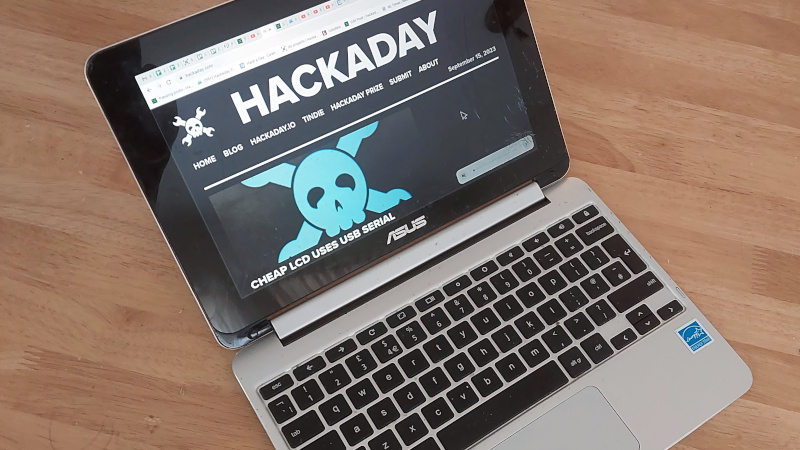It’s an acknowledged problem with the mobile phone industry and particularly within the Android ecosystem, that the operating system support on a typical device can persist for far too short a time, leaving the user without critical security updates. With the rise of the Chromebook, this has moved into larger devices, with schools and other institutions left with piles of what’s essentially e-waste.
Now in a rare show of sense from a tech company, Google have announced that Chromebooks are to receive ten years of updates from next year. Even better, it seems that this will be retroactively applied to at least some older machines, allowing owners to opt in to further updates for the remainder of the decade following the machine’s launch.
Of course, a Chrome OS upgrade on an older machine won’t make it any quicker. We’re guessing many users will feel the itch up upgrade their hardware long before their decade of software support is up. But anything which saves e-waste has to be applauded, and since this particular scribe has a five-year-old ASUS Transformer just out of support, we’re hoping for a chance to jump back on that train.
There’s another question though, and it relates to the business model behind Chromebooks. We doubt that the hardware manufacturers are thrilled at their customers’ old machines receiving a new lease of life and we doubt Google are doing this through sheer altruism, so we’re guessing that the financial justification comes from an extra five years of making money from the users’ data.

















Chromebooks…lasting more than a couple of years?
Where is this hardware?
In the hands of kids?
I don’t believe it.
I’ll grant that the newest Chromebook I’ve seen has two charging jacks, should last about two years. Not that any super cheap laptops are better. Not that most average cost laptops are better. USB charging might move the first failure part somewhere else, but cheap hardware is cheap.
Kids destroy toughbooks, which aren’t nearly as tough as they used to be.
Maybe you aren’t instilling the proper respect for devices in your kids? This wouldn’t be surprising considering how many adults treat their electronics as disposable. (Last I read, something like 1-in-5 people break their phone screen every 3 months.)
The tablet given to my eldest niece in 1st grade 4 years ago is now going to it’s 3rd user. No major scratches. No broken buttons or ports.
Her sister’s old tablet just became a wall-mounted control unit for Home Assistant. Not because anything was broken, but because the battery was beginning to fade after 4+ years of use by a 4-6 year old.
Devices CAN last just fine if they are respected. You just need to actively teach that respect.
Cheap laptops don’t last 5 years of use with adults. They rarely last 2.
Granting that’s daily use. If my mom had a computer, it would last forever, she’d never turn it on.
The most common failure, in my experience, was the old school barrel charge port. Good for about 500 plugings.
Your nieces aren’t allowed to take those tablets off the coffee table, or they’d be dead in a day. No matter how scared of angering the rents they are.
What nonsense. I have cheap laptops that are still in good condition that are pushing 10 years old. What do you do, drive nails with yours?
Look at this dude, doesn’t even use their laptop to drive screws.
Wow, every three months… I’ve never broken a screen on a phone or tablet, my wife has only done so once in more than a decade. I think the issue with kids destroying Chromebooks refers to the ones used at schools, not ones used by the children of responsible parents.
It’s happened to me three times in 10 years, each one my fault. Two tablets that I left at floor-level and got trodden on, never leave electronics on the floor. One laptop that got jumped on by cats within a week of coming out of the box. Two cats were playing near but above it and my partner said “the cats are going to land on your laptop” about 20 seconds before it happened so I had plenty of time to avoid it but was too amused by the cats. Thankfully replacing the panel was easy once I’d calmed down. One benefit to simple non-touch LCDs screwed into place.
In my experience we only had to ask for service on one of our 2 kids school-issued Chromebooks over 4 years of use, and that was only because a key switch started going flaky.
We teach them to take care of stuff, but we haven’t had to lecture them specifically on their school Chromebooks. I wouldn’t consider my kids as particularly cautious with these computers, but I’ve bought used corporate laptops on eBay in far worse shape and with more keyboard chow.
I’m beginning to think that HaHa either hasn’t met a kid old enough to use a Chromebook since becoming an adult, or isn’t an adult.
“I’m beginning to think that HaHa either hasn’t met a kid old enough to use a Chromebook since becoming an adult, or isn’t an adult.”
Or maybe you don’t know very many parents who aren’t in your own social/economic circles. Not every parent is going to raise their kids to treat things right. Schools get all kinds of parents.
> Or maybe you don’t know very many parents who aren’t in your own social/economic circles
This seems to be the root cause of a great deal of social and political conflict.
“Everyone *I* know is like me, so anyone who isn’t like me most be wrong.”
I work in IT for a middle school. Our ancient thinkpad T450’s still work great almost 10 years down the line with constant “almost unsupervised” use daily. They now run chromebook flex and are expected to receive update till 2027 since they wont get win 11.
Even the medium and low end chromebooks we use are still holding up fine, these kids just need to understand the importance of caring for devices. Maybe the absolute cheapest chromebooks could be a bit flimsy, but instilling proper care is important for any devices kids use.
T450 are pretty flimsy (compared to x230). But lid/hinge is very easy to replace. (maybe I’m thinking of t450s).
I’d run Win11 on them, the distinction was arbitrary, Broadwell and Lenovo hardware TPM can do 2.0. I routinely install W11 on Sandy Bridge
Typing this on an x230 running ubuntu, other one plugged in as an x250 on win10.
Both bought as lenovo-certified refurbs, something I never used to do (ebay corporate dumps ftw).
Good design, good implementation, forward thinking – things last. I drive an ’88 s10 30 miles each way to work every day – treat things right, and there’s nothing wrong with them.
Best way to do everything? Nope. Any legitimate reason not to? Nope.
Wow, I’d love to have an ’88 S10. I had a ’90 S10 years ago and really liked it Unfortunately, around here, once you get past maybe 20 years old, everything for sale is a rust pile. That’s actually an improvment, when I was growing up, pretty much anything over 5 years was rusting badly.
both my ASUS eee’s are still going strong
the 701 is running Linux, the 4G NAND “Drive” is a hassle, but it’s great at the top of a ladder reflashing Arduinos
my 900 running XP is still going strong (why did I buy a white one???)
the drive is this weirdo thing with a flexi track IDE connector, only 30G, I’d install Debian but I’ve got some software that only runs under XP…
Acer 311 lasted 5 years and was gifted to a neighbor for his kindergartner, current Asus is same as the author’s, going strong still. Both were used very heavily and travelled with me for work 20 to 24 weeks a year. They last. No reason to claim they don’t, and more updates means it remains relevant. Why claim they don’t? E-Waste is bad…
It’s about time, but 10 years may not be enough. I recently had to replace a 2010 Macbook that was still adequate for my needs due to a major hardware failure, I still have 3 Apple machines that are stuck at High Sierra but that are still more than adequate for their intended purposes. Even so, full support for scanning with my elderly HP multifunction printer disappeared some years ago and I had to buy a 3rd party app to scan with the new machine. In many cases, the useful hardware life far exceeds the support periods of the vendors.
Yeah, this is the problem with closed hardware and/or software. The vendors always try to force you to buy something new.
That’s great to hear.
For comparison, my Linux desktop is 11 years old and plays Baldur’s Gate 3 just fine.
The problem is not hardware getting out of date, the problem is that operating systems and apps are updated way too often, they get way too heavy (an app that does the same thing as a website should not be more than 10 megabytes), a browser should not use gigabytes of RAM. Security updates are important and should be seperated from functional updates.
I think that software developers, more than manufacturers, are responsible for most of the e-waste problem. We should just develop less software and keep using what works.
“an app that does the same thing as a website should not be more than 10 megabytes”
I’m guessing you weren’t involved in developing the electron platform then…
A-frickin-men. Half these 300 Meg apps are a skin over a browser. Often enough the software problems are because of badly written web pages rather than the ‘app’.
>We should just develop less software and keep using what works.
Agreed. Problem is, a huge sector of our economy is make-work jobs that create software no one wants or needs. We could have stopped 20 years ago and still be posting on this website in the exact same way.
My 2013 Chromebook Pixel is running fine with the latest Linux Mint.
And my CELES Samsung Chromebook 3 is running great with Manjaro too! I am a bit sad about this news, being able to buy an EOL chromebook compatible with linux was like $30…..so less ability for me to grab cheap project computers :(
This should be identified as *Chrome OS devices*, although I realize that ‘Chromebooks’ is easier to say. Google supports Chrome OS on their own devices very well, but lets the support for other manufacturers languish when the device gets older. I’ve got an ASUS Chromebox with an i7-8550U 1.8GHz CPU and 8Gb of RAM, locked at Chrome OS v103 (v96 at the end of April, but then it was allowed to spurt to v103). But my Google Pixelbook has an i7-7Y75 1.3GHz with 16Gb of RAM that can still update (currently at v116).
More damning is the ARM architecture of my Lenovo Chromebooks having 4Gb of RAM also being on (the latest) Chrome OS v116. I’ve harped on this issue for over four years now; While I expect support to end for certain Chrome OS devices (my ASUS Chromebit has a RockChip 3288-C with only 2Gb of RAM – but still performs well enough), the support EOL is very haphazard for Chrome OS. I hope this goes through for a few of my devices, but realistic realize that it probably won’t.
Mr.chromebox firmware, run whatever you want on it. ChromeOS flex, or Linux, or Brunch Project and the latest ChromeOS.
The original “business model” was that Google would provide customer support for any manufacturer’s Chrome OS devices. I used it twice initially almost a decade ago and received calls – that solved the issues – within minutes of opening the online ticket. Manufacturers could foist support issues on to Google, but I don’t know where that program is now (no issues I can’t solve on my own with the dozen Chrome OS devices that I have).
“We’re guessing many users will feel the itch up upgrade their hardware long before their decade of software support is up.”
Not all of us! Typing this on an IBM Model M keyboard, which is attached to a 2011 iMac running Ubuntu.
I recently learned about https://chromeenterprise.google/os/chromeosflex/ from Google. It basically allows you to use Chrome OS on regular laptops and PCs. I actually used it with an old-ish Chromebook that stopped getting updates and saved another device from the landfill.
Better to use Brunch project and put real Chrome OS if you want goodies like the play store and Android apps.
Kinda funny how no one mentions that Windows 10 is 8 years old and will be supported into 2025
Two years from now: Google announces EOL for Chrome OS.
I would not be surprised. It is silly that the Acer C7 Chromebook was dropped ages ago yet it’s windows-running equivalent still runs the latest Chrome just as fine as it always did.
I’m typing this on a USB keyboard plugged into a grouchy Dell Inspiron from 2019, which has had the dreaded Win11 replace function done about three times now. I’ve run Chrome OS Flex on a Dell that came out about a year and a half before it, twice. I also have a Chromebook made by Dell, that was last sold by the same agency that sold me this one, also in 2019, but the design is from 2018. (It was practtically given to me by a fellow at the VCF Winter dig about two years back.) I think this is amazing because technology can be daunting to some of us. And I do know why cats like laptops for the same reason they spend their days in our laps…..
What is the “Win11 replace option?”. Just turn off TPM and PC won’t auto “upgrade”
@Jenny List said: “Chromebooks Now Get Ten Years Of Software Updates”
It take just a tiny fraction of that time for Google’s Chromebook to totally PWN you. Same goes for your Android phone.
That’s nice, I’ll just keep on using mr.chromebox firmware and loading brunch project and the newest chrome os. Or Lakka, or Retropie, or mint, or (horrors) win10 LTSC
Because linux mint LTS releases might only be supported 5 years, but they will run on any hardware (no weird requirements about TPMs), they don’t force potentially damaging mandatory updates on you, and even when they aren’t supported any more, they are still pretty usable because security vulnerabilities for linux system are usually only locally exploitable anyway, things as damaging as the typical bug a windows update has to patch for are rare.
People complained about Linux being difficult and not having Windows apps and than glorified a netbook with even less software that was even more crippled when disconnected from internet. In return it becomes obsolete because of short term support.
10 years of support is nice but still short.
Modern user focused Linux distros (Mint, Ubuntu…) aren’t difficult at all, they’re easier to use on a day to day basis, the only more difficult than on Windows is making a mess of the OS. As for needing Windows exe programs to run, I fully sympathise, I, despite being a Linux evangelist am in that situation. WINE is often helpful, works for all the Windows exe programs I personally use, but where a particularly stubborn program won’t work under it there is always the option to have a VM with Windows inside it. Stable, trustworthy, user controlled Linux host, with unstable, untrustworthy, corporate remote server controlled Windows locked away in a virtual machine prison, kept isolated from the internet, but with the cell door opened on those (probably quite regular) occasions you need to run an exe program. All requires intel/AMD x86 ofcourse, so chromebook hardware is a useless non-starter.
“Chromebooks Were Once a Good Deal for Schools. Now They’re Becoming E-Waste.”
https://www.wsj.com/tech/chromebooks-were-once-a-good-deal-for-schools-now-theyre-becoming-e-waste-dc93833b
Poster spent ~$500+ attempting to get a Linux working on Lenovo N4020 and MediaTek ARM Chromebooks.
Contractor got Arch Linux sort-of working on the N4020.
ARM attempts failed … so far.
Ubuntu works great on a $129 Walmart 14 inch Lenovo Ideapad 1i 4/128 GB N5030 4+0 cores 3.2 gHz turbo, hdmi, 1 usb c 2 usb a, and sd card.
They were e-waste to start with on those specs 🤷♂️, so I’m not sure what they are on about.
The hardest issue will not be OS support but be replacing batteries in these sealed units. Schools complain about replacement costs, but is it really cost effective for them to replace batteries especially if they don’t have the right staff in house?
How the hell one of those emmc memory bullshits fit an update just basic windows takes up all but under 10 GB of my old one.. can’t save doom 98 on that sucka… ( can but you get it)
Once I have red review of a cheap laptop with 32GB of emmc memory. After first booting Windows asked reviewer to update so he did but Windows replied there is not enough memory – installed Windows was around 28GB.
This is why you need ChromeOS (it’s smaller) and why I prefered netbooks (my first netbook had 250GB HDD, 2GB RAM and that was in 2012).
I’d say that Google’s business case is that they’d rather get money for Google Docs/Drive from school boards, than have them spend it replacing devices. Many school boards still don’t have ‘one-laptop-per-child’, and will never get there if they have to start replacing devices because of software/firmware lacks. That limits how far Google can push into the classroom, particularly in poorer regions.
Will the hardware manufacturers be happy? Maybe a tad less happy, but I’ll bet this will increase spending in richer boards as they realize that they can replace teacher chromebooks with higher-margin units, because they can recycle them to students.
Sadly the one in the picture (Asus C101P) didn’t get it’s EUA bumped. Too bad since I don’t think there’s a new one in the same form factor!